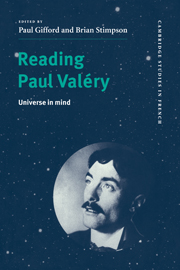Book contents
- Frontmatter
- Contents
- Contributors
- Abbreviations
- Introduction
- PART 1 SELF-SCIENCE
- 1 Towards a biography of the mind
- 2 Thinking-writing games of the Cahiers
- 3 Paradigms of the self: Valéry's mythical models
- 4 The fascination of science
- 5 An art of rethinking: Valéry's ‘negative philosophy’
- PART 2 SELF-WRITINGS
- PART 3 BODY, MIND, WORLD
- Conclusion
- Bibliography
- Index
- Cambridge Cultural Social Studies
5 - An art of rethinking: Valéry's ‘negative philosophy’
Published online by Cambridge University Press: 04 August 2010
- Frontmatter
- Contents
- Contributors
- Abbreviations
- Introduction
- PART 1 SELF-SCIENCE
- 1 Towards a biography of the mind
- 2 Thinking-writing games of the Cahiers
- 3 Paradigms of the self: Valéry's mythical models
- 4 The fascination of science
- 5 An art of rethinking: Valéry's ‘negative philosophy’
- PART 2 SELF-WRITINGS
- PART 3 BODY, MIND, WORLD
- Conclusion
- Bibliography
- Index
- Cambridge Cultural Social Studies
Summary
Traditionally, Valéry's reputation rests on his published work as poet and essayist. The era of the Cahiers has however brought to light another dimension already hinted at in La Soirée avec M. Teste, Introduction à la méthode de Léonard de Vinci and the Dialogues (Eupalinos, L'Ame et la danse, L'Idée fixe, Dialogue de l'arbre): Valéry is now seen as one of the major thinkers of the century.
To be sure, he himself wryly disclaimed any right to ‘le beau titre de philosophe’ (‘the fine title of philosopher’) (Œ, ii, p. 1499), since he saw himself quite apart from the map of knowledge and specialist competence as drawn by the university establishment of his day. Unmistakably, however, the Cahiers show us an activity and practice of thought which, though it disdains the heavy apparatus of the systematic philosopher, nonetheless tackles many of the essential problems of philosophy. ‘Fondateur de la Philosophic Négative’ (‘Founder of negative philosophy’), says Valéry, defining his originality with a self-ironic flourish. He adds significantly: ‘La plus positive de toutes’(‘the most positive of all’) (Ci, p. 747).
Negative philosophy is critical philosophy. Valéry was, throughout his life, a consistent critic of his philosophic predecessors and their discipline as consecrated in traditional practice. His critical bent is best illustrated in the three favoured areas of language, metaphysics and ethics.
- Type
- Chapter
- Information
- Reading Paul ValéryUniverse in Mind, pp. 85 - 102Publisher: Cambridge University PressPrint publication year: 1999

